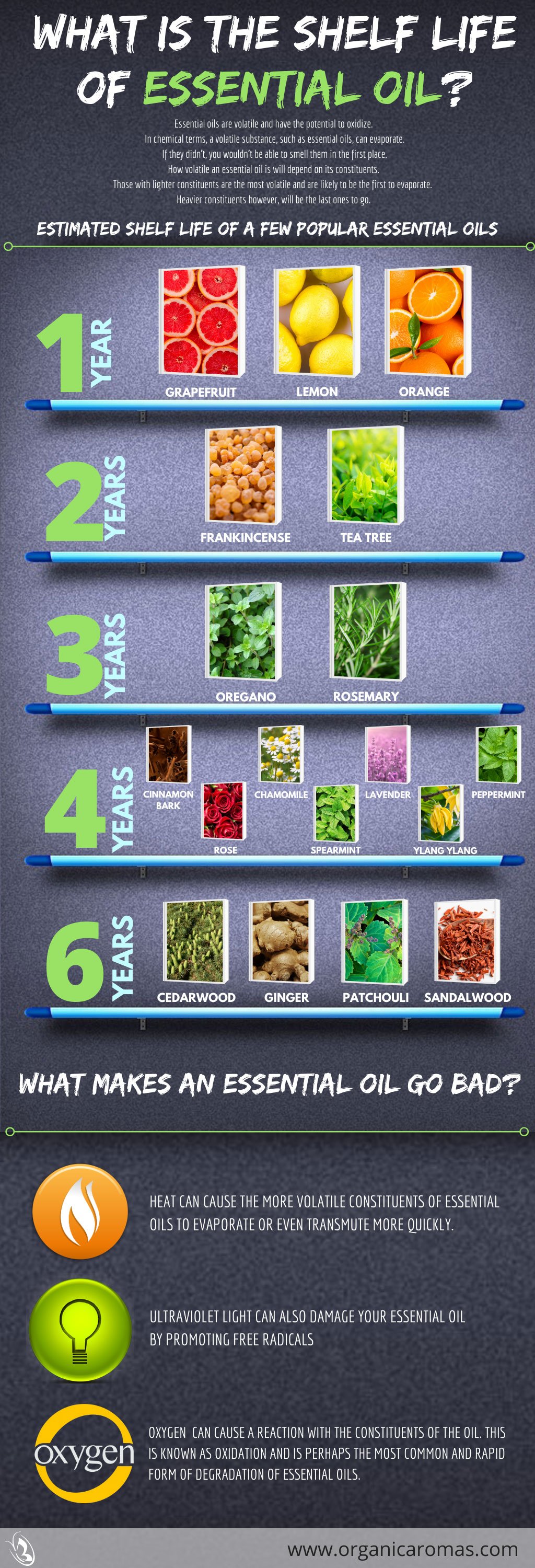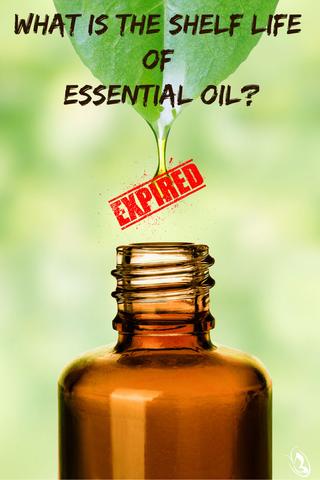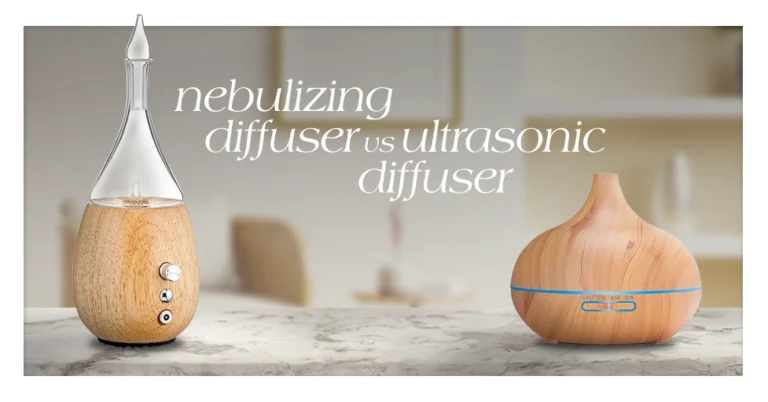What is the Shelf Life of Essential Oil?
Most people are quite surprised to find out that essential oils have a shelf life. Some may have even been told otherwise simply to justify a higher price tag.
However, the truth is that essential oils have a shelf life no matter what brand you purchase from. This is due to the fact that essential oils are volatile and have the potential to oxidize. In chemical terms, a volatile substance, such as essential oils, can evaporate. If they didn’t, you wouldn’t be able to smell them in the first place.
How volatile an essential oil is will depend on its constituents. Those with lighter constituents are the most volatile and are likely to be the first to evaporate. Heavier constituents however, will be the last ones to go.
Estimated Shelf Life of a Few Popular Essential Oils
1 Year: Grapefruit, Lemon, Orange
2 Years: Frankincense, Tea Tree
3 Years: Oregano, Rosemary
4 Years: Cinnamon Bark, Chamomile, Lavender, Peppermint, Rose, Spearmint, Ylang Ylang
6+ Years: Cedarwood, Ginger, Patchouli, Sandalwood

What Makes An Essential Oil Go Bad?
Essential Oil Safety states that contaminants and degradation can all increase the toxicity of essential oils and can cause them to spoil. When it comes to degradation of essential oil, it typically occurs from three ways: heat, light, and oxygen.
Heat: As you can imagine, heat can cause the more volatile constituents of essential oils to evaporate or even transmute more quickly. If you do not have any children to worry about, you might want to keep your oils in the refrigerator to ensure it doesn’t get damaged by changes in temperature.
Light: Ultraviolet light can also damage your essential oil by promoting free radicals. Thankfully, amber colored bottles are great at keeping UV light from harming their quality. Still, you may want to ensure that your essential oils are always stored in darkness to stay on the safe side.
Oxygen: When oxygen gets into your essential oil bottle, it can cause a reaction with the constituents of the oil. This is known as oxidation and is perhaps the most common and rapid form of degradation of essential oils. This can cause the therapeutic properties of the essential oil to breakdown, change their chemical composition and increase your risk of sensitization. This is why you must always make sure your essential oils are sealed tightly and only exposed to air for short periods of time. In addition, only use essential oils in moderation.
Pin It!



Very interesting.
Good to know…
Thanks for the info.
Very helpful.
Very Informative, Good Job. Keep it up!
I am new to the whole topic of aromatherapy and this post was really helpfull. I found quite little information on Youtube and I am glad that I came across this blog. I’ll check out other of your posts as well.
Greetings from Poland,
Martyna
Interesting, I would have thought the citrus oils would have lasted longer
I guess it only makes sense that oils expire or change it strength, etc. I have some oils. I’ve never bothered to look for an expiration date or at least the year it was made. Thank you for the chart. It is very useful. I did pin this. Thank you for sharing!!
Very good, thanks 🙏
Thanks. Aroma oil newbie here, good to know 🙂
Thank you, I will save money with these informations! 🙂
Good to know. I did not know different scented oils had different shelf lives.
Thanks for this insight
Thanks for this informative article. It is good to know that the citrus essential oil has such short shelf life. I am looking forward to read more articles from your website. Very interesting!
Great information to have in a nice chart format.
Thank you, very informations
good to know i have a lot of oils
Thanks for info
tHANK YOU FOR ALWAYS PROVIDING SUCH USEFUL AND HELPFUL INFORMATION
I think it’s perfect that the essences last longer without degrading
I thought they had an unlimited useful life, thank you very much for the clarification.
The good thing is that the useful life of all is quite long, there is no evaporation problem in my case.
Appeciate the information. It is enlightening to know that there is a shelf life for essential oils. Also factors such as light, oxygen and heat are the viable causes that should be avoided.
Ooo thanks – wasnt aware of the shelf life date of oils – time to sort mine
One to six years depending on its constituents. Essential Oils are so wonderful and therapeutic.
wow I did not know that different oil have certain life shelf times
Not only was the topic relevant, the graphics are outstanding! Thanks.
Thank you for these informations!
I had no idea! Thank you!
Appeciate the information. It is enlightening to know that there is a shelf life for essential oils. Also factors such as light, oxygen and heat are the viable causes that should be avoided.
Great information to have in a nice chart format.
I honestly didn’t know(or even think about) there being a shelf life for essential oils.(though it makes total sense) Thanks so much for posting this ! I love using tea tree oil in many ways (one using it diluted with water on skin abrasions/ cuts ) and so I definitely wouldn’t want to be using it expired for that!
Very good to know. I had no idea that certain oils last longer than others.
Thanks for the information, I did not know that they had different expiration dates
This is great information that I have been needing. Thank you for sharing.🌼🍃
Very important info here. I keep my oils in a sealed, dark container in my refrigerator. Probably the oxygen factor is what I should be worried about the most. That will motivate me to not put too much oil in my diffuser, unless I plan on using it all right away. And I will pay attention to the expiration dates on the bottles!
Thank you, very useful informations!
This a great article. I wasn’t aware that essential oils do go bad. I’m planning on checking all of my oils for expiration dates. I do know that some of my oils are at the 2-year marl. now. Do you have a better chart listing all the essential oils with their expiration dates? Thanks for the information, it is greatly appreciated.
Thanks for the info!
This a great article. I wasn’t aware that essential oils do go bad. I’m planning on checking all of my oils for expiration dates. I do know that some of my oils are at the 2-year marl. now. Do you have a better chart listing all the essential oils with their expiration dates? Thanks for the information, it is greatly appreciated.
Thank you, very useful informations!
very interesting! It felt like I was back in science class again and very informative. I am glad to see cinnamon oil and peppermint last longer than citrus ones as they are more seasonal at times and can be used the next year without going bad. I try to keep m oils in a cool dark space. thanks for the information .